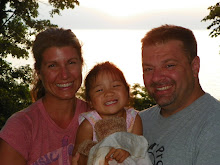So…plans are moving along. We are re-doing the bathroom, the last room of the house that needs a good once-over before the little one arrives.
Right now, Shawn and I are reading a book that Dr. Powell gave us, “Raising Your Internationally Adopted Child” (very apropos, right?) It pretty much takes you from the first hours with your new child, all the way through the teenage years, discussing what can be expected, how to handle various situations, and shedding a lot of light on the adoption experience, particularly from the child’s perspective. In fact, many books on adoption focus on the parent(s) and completely miss the crucial perspective of the adopted child, which can be very detrimental.
I am only a quarter of the way through the book and it has really impacted me in a big way. I was amazed to learn that children as young as a few months or even a few days old are capable of being aware of loss and separation (considered implicit memory), especially from their birth mother. This sense of loss can in turn affect their lives years later, possibly even without their ability to realize and verbalize where it originates. There are also numerous bio-chemicals released between birth mother and child that just aren’t there when you adopt, which can place adoptive parents at a disadvantage in connecting or bonding with their child from square one. Then, given all of the disruptions in an adopted child’s life, especially depending on their age upon adoption, they can have a false sense of autonomy or independence out of necessity. After all, this “independence” is how many of them learned to survive so well within their institution. Unfortunately, this autonomy that served them so well before can prevent, or at least make it a lot more difficult, to connect with others, including their new parents who seem like just two more random people who will eventually leave them again.
In all of the information and stories shared in this book, I began to think of Mali and all of the losses she has suffered in her young life, not even a year old yet. Not only was she separated from her birth mother, but then from the person that found her, then the police who briefly had her and tried to locate her birth parents, and now she is once again with various caregivers in the orphanage, not necessarily knowing who will be feeding her, changing her, cuddling her, etc, each day. I can’t imagine living with that instability and yet, from her records, she appears to be surviving, and dare I say thriving in some aspects. Evidently she has gotten accustomed to this ever-changing existence.
Then I thought of our coming over to bring her to her new home, disrupting her life once again and ripping her away from the life she has gotten used to living. I began to feel very sad, even guilty for what we are doing. I can’t stand to think of causing her any more pain than what she has already endured. I know that in the long run, her life in our family would hopefully be better than a life lived in an institution however it really upsets me to think of hurting her again, even if it is for a greater good.
I began to think about my guilt, and wondered if it wasn’t really guilt, but rather a grieving process for Mali’s losses, for her separation from the parents and life into which she was born. The book emphasizes how important it is to acknowledge Mali’s life before she entered our family, as well as the present she is experiencing with us, and to reassure her about the stability we will do our best to provide for her future. As adoptive parents, we need to openly talk about her complicated history, acknowledge her life experiences from HER perspective, and to encourage any and all feelings she may have about it, piecing it together like something of a jigsaw puzzle at times since none of us will know the entire story for certain.
Thankfully, this book provides a ton of information and a ton of suggestions for how to discuss and handle difficult situations and topics as they arise. I have been taking notes and highlighting various portions in order to be as prepared as I can be for Mali. I just hope I can be the mom that she needs me to be…honestly, I am really nervous.
Thursday, February 5, 2009
Subscribe to:
Post Comments (Atom)


I would worry about any expectant parent who wasn't a little nervous. Each situation brings its own set of unique circumstances, and little Mali has had her ups and downs, as have you and Shawn. I think it's amazing, and just more evidence of what great parents you are that you are acknowledging the challenges Mali has, and will face, and are doing what you can to be the best support you can be. After all, that is all you can do, and everything you can do. You are awesome. You will learn her perspectives more and more as you grow with her, but it is so great that you are willing to put so much preparation and effort into your child. I wish all parents would do the same.
ReplyDelete